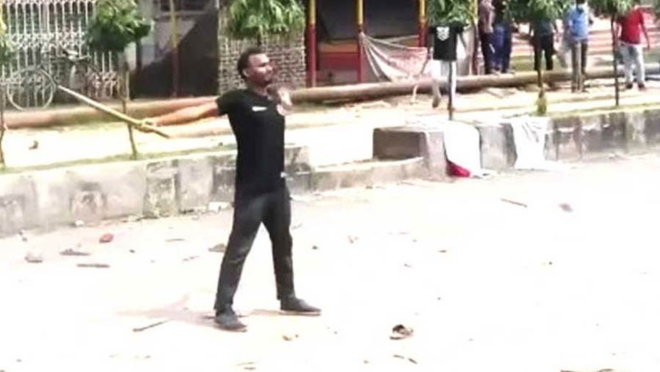The killing of Abu Sayed: How the anti-quota movement turned into a nationwide uprising
The killing of Abu Sayed: How the anti-quota movement turned into a nationwide uprising

16 July 2024, Rangpur.
It was around 2pm. As the quota reform movement intensified, police launched a violent crackdown on student protesters. Amid the chaos, someone pleaded through a microphone, “Please don’t shoot the unarmed students!”
In that moment, a young man in a black T-shirt stepped forward. Alone. Arms spread wide, chest bare—an image that would soon become the most iconic symbol of the July Revolution.
“Shoot me. Shoot me!”
He was unarmed. Unafraid. Perhaps he believed the police wouldn’t fire at a student with no weapon. Perhaps he still believed in reason.
At 2:17pm, police pulled the trigger. Three shots were fired. Abu Sayed collapsed. He was rushed to Rangpur Medical College Hospital, but it was already too late. At 3:05pm, his death certificate read: “Brought dead.”
Abu Sayed, a student at Begum Rokeya University in Rangpur, was killed during a protest against the government’s discriminatory quota system. His final moments were broadcast live on television. The country watched in horror as he was shot—not once, not twice, but three times. The nation also saw who fired those shots.
I remember watching the footage on TV, utterly horrified. Tears streamed down my cheeks. My blood boiled with rage. And yet, I felt utterly helpless. So did countless others, gripped by the same fury and despair buried in their chest.
He stood alone, arms outstretched, facing the barrels of state power. And still, they chose to shoot.
Just the day before, on 15 July, Dhaka University students were brutally attacked by Chhatra League operatives. That violence lit a fuse. The rage spread across campuses nationwide. Abu Sayed, the Rangpur coordinator of Students Against Discrimination, refused to remain silent. He knew he was standing on the right side of history.
A student of English literature, Sayed had grown up in Babanpur, Rangpur. A meritorious student, he likely dreamt the same dreams many of us do—clearing the BCS exam, securing a stable job, building a life of dignity. But the quota system betrayed youths like him—leaving them in the abyss of frustration, despite their degrees, their merit, their effort.
On 16 July, Sayed became the first martyr of the anti-quota movement. His death escalated the quota reform movement. It grew larger, louder, and fiercer. He became the spark that lit a firestorm. That fire swept through the country, and soon, nothing could stop it. A revolution had begun that would eventually overthrow an autocratic regime at the cost of nearly 1,500 lives.
That very day, as Sayed lay dying in Rangpur, reports of deaths poured in from all corners of the country. It had become a nationwide procession of death.
In the forensic documentary Shoot Me, I Bare My Chest!, produced by Drik and Forensic Architecture, investigators confirmed that 12-gauge shotguns were used to fire at Sayed. Each cartridge contained 360 metal pellets. The first shot struck his abdomen. Sayed didn’t flinch. Six seconds later, another officer fired and that too probably hit Sayed. Then came the third shot—hitting him in the face. He was bleeding, then started to tremble and moments later collapsed on the street.
His friends rushed to carry him—by his arms, legs, anything they could hold—but he was already gone.
A UN report later revealed that Sayed’s chest alone held at least 90 metal pellets—50 on the right chest and 40 on the left.
Imagine getting hit by a hundred metal pellets in a few seconds! How horrifying is that!
Just a day before his death, Sayed had posted a photo of a memorial plaque bearing the words of Mohammad Shamsuzzoha, the martyred Rajshahi University professor from the 1969 uprising:
“Today, I am drenched in the blood of my students. If a bullet is to be fired next, may it hit me instead of them.”
Sayed had written, “Sir! We really need you at this very moment, sir!”
He ended with a line that now feels hauntingly prophetic: “To die as a Shamsuzzoha is far more joyous, dignified, and worthy than a lifetime without courage.”
Did he already know what was coming?
A year has passed.
Charges have been pressed. Arrests made. Trials are ongoing. But is this justice?
Will this be enough for Abu Sayed’s soul to rest in peace?
No.
Justice will only be served when fairness is no longer a luxury. When no student must stand in front of guns to demand what is rightfully theirs. When a degree no longer leads to despair.
Until then, every time injustice rises—another Abu Sayed will rise too.
He will stand, arms wide open, chest bare, and say, “Shoot me.” And so, Abu Sayed lives on.


